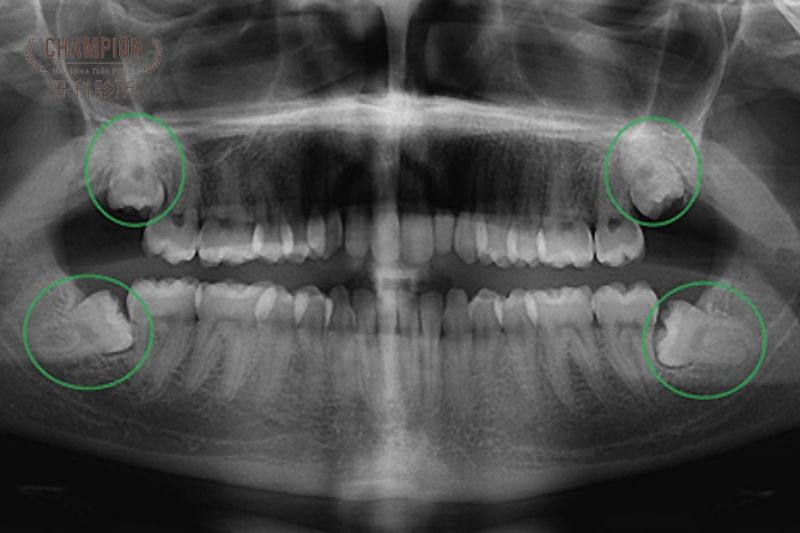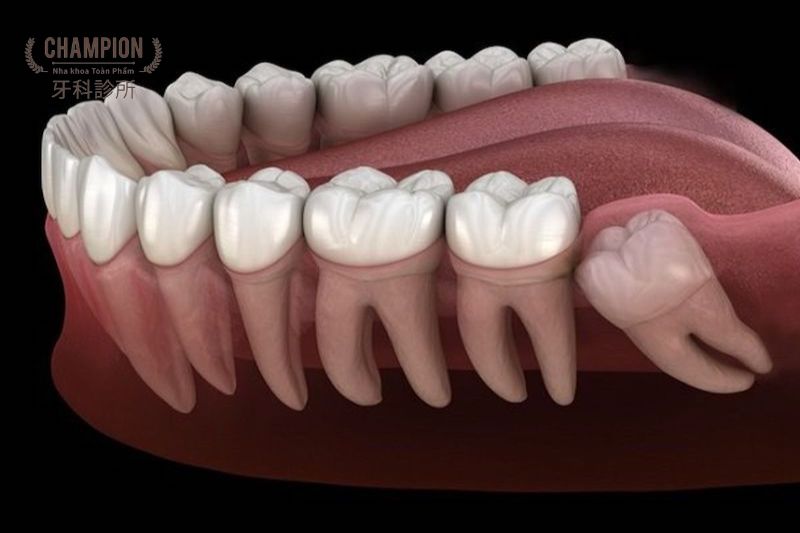Wisdom teeth misalignment refers to the condition where the eighth teeth grow in improper positions, often pushing against adjacent teeth or growing beneath the surface of the jawbone. This is a common dental issue that can lead to various complications if not promptly treated. In today's article, let's explore the causes, symptoms, as well as the treatment methods for this dental condition, together with Champion Dental Clinic.
How are wisdom teeth misaligned?
Wisdom teeth, also known as the eighth teeth, play a crucial role in the human tooth development process. Typically, the eruption of wisdom teeth begins during adolescence, usually between the ages of 17 and 25. However, not everyone undergoes this process without experiencing painful and uncomfortable issues.
Some cases of misalignment of wisdom teeth include:
- Straight growth: Some individuals are fortunate as their wisdom teeth grow straight without causing any issues. In these cases, the eruption of wisdom teeth occurs without significant pressure on the adjacent teeth.
- Angled growth: Wisdom teeth can also grow at an angle, exerting pressure on neighboring teeth and causing discomfort. This pressure may lead to the displacement of other teeth, impacting the overall alignment of the dental arch.
- Horizontal positioning: A common scenario is when wisdom teeth grow horizontally beneath the gum line. This not only causes pain but also increases the risk of gum inflammation and creates favorable conditions for bacterial growth.
- Submerged growth under the gum: Wisdom teeth may grow submerged beneath the gum line, creating a pocket that harbors food particles and bacteria, leading to inflammation. This can result in swelling, soreness, and an increased risk of oral issues.

What causes misaligned wisdom teeth?
Here are common causes contributing to the misalignment of wisdom teeth:
- Insufficient jaw space: This is the most common cause of misaligned wisdom teeth. When the jawbone lacks enough width to accommodate all teeth, wisdom teeth may not have enough space to erupt properly, leading to misalignment.
- Impacted wisdom teeth: Impacted wisdom teeth occur when the teeth are trapped inside the jawbone and cannot erupt normally. This condition can cause wisdom teeth to grow in a tilted direction or exert pressure on adjacent root structures.
- Genetic factors: If parents or close relatives have experienced misaligned wisdom teeth, there is a higher likelihood of a similar condition occurring. Genetic factors influence the size, shape, and eruption pattern of wisdom teeth.
- Dietary habits: A diet consisting of soft, non-chewy foods may hinder the full development of the jawbone, resulting in insufficient space for the proper eruption of wisdom teeth. Consuming excessively hard foods can also impact the positioning of wisdom teeth.
Identifying Signs of Misaligned Wisdom Teeth
To recognize the condition of misaligned wisdom teeth, you can rely on the following signs:
- Pain: This is the most common indication of misaligned wisdom teeth. The pain can be dull or intense, radiating to neighboring areas such as the ears, neck, and shoulders.
- Swelling: The surrounding gum tissue of misaligned wisdom teeth may become swollen, red, and warm.
- Difficulty in mouth opening: Swelling can make it challenging to open your mouth or chew food.
- Infection: Misaligned wisdom teeth are prone to bacterial invasion, leading to infection.
- Damage to adjacent teeth: Misaligned wisdom teeth may press against neighboring teeth, causing cavities, enamel erosion, and even impacting the surrounding bone.

>> See more: Taking care of your oral hygiene properly to prevent tooth erosion
Dangerous Complications of Misaligned Wisdom Teeth
Each eruption of wisdom teeth carries the risk of oral health complications that cannot be avoided. Common problems that may arise due to misaligned wisdom teeth include:
Gum inflammation: As wisdom teeth erupt, the risk of gum inflammation and swelling is high. Improper oral hygiene during eruption can lead to red, swollen gums and pain. In the case of misaligned wisdom teeth, crowding can increase the risk of inflammation and damage to surrounding soft tissues.
Bad breath: Discomfort from the eruption process of misaligned wisdom teeth can reduce oral hygiene, providing a breeding ground for bacteria. The accumulation of bacteria can cause bad breath, creating an unpleasant and uncomfortable situation that not only affects one's confidence but also may lead to social communication issues.
Tooth misalignment: Misaligned wisdom teeth not only affect themselves but also influence the position of surrounding teeth. This can lead to crowding, altering the shape of the dental arch and causing severe misalignment. This not only affects the aesthetics of the smile but also makes tooth cleaning difficult, increasing the risk of cavities and gum inflammation.
Tooth decay: The growth of wisdom teeth, whether misaligned or not, creates favorable conditions for bacterial development. These bacteria can attack adjacent teeth, causing cavities that may spread to other teeth in the arch. Tooth decay not only causes pain but can also lead to serious oral health issues such as gum inflammation and tooth loss.

Should misaligned wisdom teeth be extracted?
Misaligned wisdom teeth are a common concern that often raises many questions for patients. Determining whether to extract wisdom teeth requires a careful evaluation by a dentist. Here are some considerations when making this decision:
- Pain and discomfort: Misaligned wisdom teeth, especially when lacking sufficient space, can cause pain and discomfort. This not only impacts daily life but also increases the risk of damage to adjacent teeth due to improper cleaning.
- Risk of crowding and misalignment: Misaligned wisdom teeth may crowd and misalign neighboring teeth. This not only causes pain but also results in unevenness in the dental arch, affecting both aesthetics and function.
- Danger from submerged wisdom teeth: There is a high risk when wisdom teeth grow submerged beneath the gum or horizontally through the adjacent seventh tooth. This can lead to infection, bone loss in the tooth socket, swelling, and pain. In severe cases, adjacent teeth may be damaged, and cysts may form in the jawbone.
Dentists will assess the specific condition of wisdom teeth, considering support from the dental arch and gum health. In some cases, extracting misaligned wisdom teeth may be the optimal choice to prevent potential complications.
Conclusion
Complications arising from misaligned wisdom teeth not only create oral health issues but also impact daily life quality. Proper oral hygiene maintenance and regular dental check-ups are essential to prevent these negative effects. If you are experiencing discomfort due to misaligned wisdom teeth, contact Champion Dental Clinic for an early examination.
Vietnamese & English: (028) 5411-2295
中文: (028) 5411-2297 172 Nguyen Luong Bang, Tan Phu Ward, District 7, Ho Chi Minh City.
Fanpage: Champion Dental Clinic 牙科診所
Zalo: Champion Dental Clinic
Youtube: Champion Dental Clinic 牙科診所
 Champion Dental Clinic
Champion Dental Clinic



